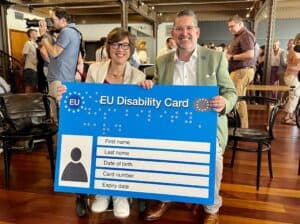On the 27th of October the European Parliament’s Committee on Petitions hosted a workshop on the new Disability Rights Strategy 2021 – 2030 (the Strategy) with the Commissioner for Equality Helena Dalli (the Commissioner).
The Commissioner opened the workshop highlighting that the consultations on the post-2020 EU Disability Strategy are ongoing. The Commissioner emphasised that the new post-2020 European Disability Strategy will focus on the implementation of the UN CRPD, the European Pillar of Social Rights, the Sustainable Development Goals and the EU Charter of Fundamental Rights. The Strategy’s priorities will be increasing accessibility, improving mobility and ensuring freedom of movement, participation in democratic process and independent living. The Strategy will also focus on the development of new skills for new jobs, increasing labour market participation and ensuring inclusive and non-discriminatory employment. The Commissioner highlighted that it is essential to ensure that social protection systems protect from poverty and social exclusion and that persons with disabilities have an equal access to inclusive and quality education and health services. The Strategy will also cover international cooperation and external EU action and will demand for the EU itself to lead by example as public administration.
Moreover, Professor Lisa Waddington and Dr Andrea Broderick from Maastricht University presented a study commissioned by the European Parliament’s Policy Department for Citizens’ Rights and Constitutional Affairs at the request of Petitions Committee (PETI). The study analysed the European Disability Strategy 2010 – 2020 and made recommendations regarding the new post 2020 EU Disability Strategy.
The study included the following recommendations, which EUD fully supports:
- The UN CRPD, and other relevant UN instruments, should frame the design of the post 2020 European Disability Strategy;
- The post-2020 European Disability Strategy should take account of the Concluding Observations of the UN Committee on the Rights of Persons with Disabilities;
- Involve persons with disabilities and other key stakeholders in the design of the post-2020 European Disability Strategy;
- Map EU and Member State competences regarding the UN CRPD;
- Review and map EU law and policy in light of the UN CRPD;
- Establish a baseline data set and indicators, and support the ongoing collection and compilation of data on the situation of persons with disabilities;
- Identify and periodically update the first list of actions (implementation plan) for the new EDS;
- Maintain the existing priority areas of action and add a new priority area for action: Citizenship rights;
- Adopt a cross-sectoral approach, addressing gender and intersectionality;
- Address autonomy and legal capacity;
- Participation should be a cross-cutting priority area of the new Strategy;
- Address new areas of importance: Digital inclusion and new technology;
- Address, to a greater extent, awareness-raising and combating stereotypes and stigma;
- Conclusion of the Optional Protocol to the CRPD by the EU;
- Set up focal points in each EU institution, Commission Directorate-Generals and EU agencies;
- Adopt a systematic approach to disabilty mainstreaming and identify EU officials responsible for ensuring disability mainstreaming;
- Set up an inter-institutional coordination mechanism;
- Participation of disabled persons organsiations and other civil society groups in the design and implementation of the post-2020 Strategy should be regulated by a code of conduct/guidelines;
- Ensure interaction between the new Strategy and other EU instruments and programmes;
- Ensure that the objectives of the Strategy are mainstreamed in the work of the EU administration;
- The Better Regulation Guidelines, impact assessments and evaluations should take account of disability;
- Ensure complementarity of the post-2020 European Disability Strategy with Member States’ disability strategies;
- Facilitate cooperation between relevant actors at the national level;
- Establish a specific budget linked to the new European Disability Strategy;
- Identify and periodically update a list of actions (implementation plan);
- Conduct a mid-term evaluation;
- Ensure individual evaluations of instruments adopted as part of the new Disability Strategy and Member State compliance;
- Establish a baseline data set, establish indicators, and support the ongoing collection and compliation of data on the situation of people with disabilities;
- Establish a specific budget line to enable participation and involvement of DPOs and CPOs in monitoring the implementation of the post-2020 European Disability Strategy.
The workshop was an informative event where many important recommendations for the post 2020 EDS were presented. EUD will continue closely monitoring the developments regarding the post 2020 EU Disability Strategy in order to ensure that such recommendations are adequately reflected in the new Strategy.
To read the full study please click here https://www.europarl.europa.eu/RegData/etudes/STUD/2020/656398/IPOL_STU(2020)656398_EN.pdf













